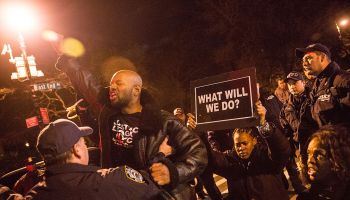Former South African president and freedom fighter Nelson Mandela is dead at the age of 95. According to the New York Times:
“Our nation has lost its greatest son,” President Jacob Zuma said in a televised address on Thursday night, adding that Mr. Mandela had died at 8:50 p.m. local time. “His humility, his compassion and his humanity earned him our love.”
The saga of Nelson Mandela‘s rise from poverty, to a prison cell and to the presidency of South Africa is proof that, even in this confused and often unjust world, miracles do happen.
What else short of divine intervention could explain how the freedom-fighting activist sent to prison for 27 years could have been so ready to govern Africa’s most powerful nation?
RELATED:
POTUS On Mandela’s Passing: ‘He No Longer Belongs To Us, He Belongs To The Ages’
How could his election have been achieved with relatively little bloodshed, despite the brutality of the ruthless White regime?
Then there’s Mandela’s overcoming bitter racial, ethnic and clan divisions to build a functioning government–and refusing to overstay his welcome as so many other African leaders have done.
RELATED: Where Was Nelson Mandela Born?
And, even more astonishing, Mandela brushed aside bitterness of his own incarceration and anger with White colonialism to lead the new nation. By what means could a man fresh out of prison achieve all of this? A miracle. Plain and simple.
RELATED: Who Is Nelson Mandela’s Wife?
It’s easy to forget just how dangerous South Africa was leading up to the first all-race election in 1994.
Watch A Short Bio On Nelson Mandela’s Life Below:
Now, South Africa is a democratic nation and leader on the continent. Before, however, South Africa was a outcast nation, run by a racist and bloodthirsty White minority struggling under global economic sanctions. As if the apartheid government weren’t bad enough, tensions pitting Mandela’s African National Congress and the massive Zulu-led Inkatha Freedon Party threatened to cut the nation in two.
RELATED: How Long Was Nelson Mandela In Prison?
I witnessed the tension firsthand having spent a month in South Africa covering the election for the Cleveland Plain Dealer newspaper. And at times, it seemed certain the country would collapse in violence.
Want to Keep Up With NewsOne.com? LIKE Us On Facebook!
The Sunday before the election, a massive car bomb exploded outside of the ANC Shell House headquarters in Johannesburg, killing nine. A month earlier, 20,000 Zulus marched outside of the Shell House; Nineteen were shot dead by ANC security guards, fearing an all out bloodbath.
But through it all, wary South Africans spoke of “the old man” who seemed to be the only person who could lead the nation back from the edge. And he did.
At campaign events, Mandela, a lawyer by trade, spoke with an ease, humility and vision for the future that somehow fused all segments of society. Listening to his words of reconciliation, it was impossible to believe that he had spent a third of his life in the most brutal of prison conditions.
Watch Nelson Mandela’s 1994 Inaugural Address Below:
Mandela bided his time for a while, but an international clamor for his release began about a decade later. With no thanks to the Reagan administration, which viewed Mandela as a terrorist, Mandela and other aging freedom fighters like Walter Sisulu looked on as violence increased and the White government began to buckle under the weight of international economic sanctions.
Civil war became a distinct possibility.
Through complex negotiations with the government, Mandela won his release in 1990 in a globally televised event and became the head of the ANC. It wasn’t until 1993 when the country, again, headed towards civil war with the killing of ANC leader Chris Hani that the government decided its first all-race elections should be held.
But who, if anyone, could lead the fractured country?
It became clear that only the 75-year-old Mandela had the near universal appeal necessary to take the helms of South Africa.
In April, he won 62 percent of the vote. But his genius was shown by having the former White president, F.W. de Klerk, as his deputy, ensuring support from White minority rule to a black majority government. In fact, the loudest voice of dissent came from Mandela’s estranged wife, Winnie, who complained that Whites should have been punished more harshly for their apartheid past.
The hallmark of Mandela’s government was the Truth and Reconciliation Commission which granted amnesty for testimony of all crimes committed earlier on both sides of the freedom struggle.
It wasn’t easy for anyone to listen to the reports of assassination, rape and torture knowing the perpetrators would walk away free. But it was the genius of Mandela to understand that was the only way the young country could bury its bloody past.
With a new wife Graca Machel at his side, Mandela gradually reduced his public schedule in his post-presidency years. He has lent his name and prestige to fighting childhood illness and AIDS research.
In most corners of the world, Nelson Mandela is likely the world’s most admired man. So his passing isn’t a loss for South Africa; It is a loss for the world.
If a better word than miracle can be found in the dictionary to describe the life of Nelson Mandela, I have yet to discover it.
















